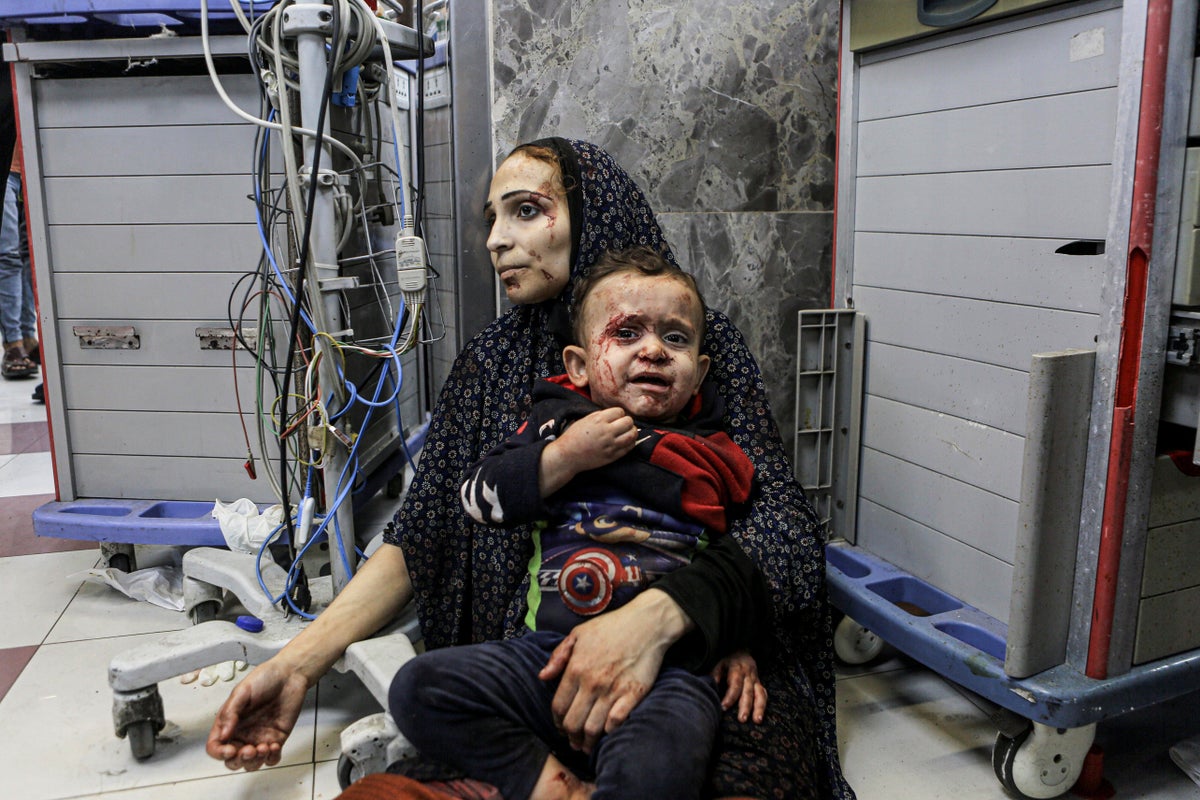
Patients are being operated on without anaesthetic in Gaza because supplies are so low, the World Health Organisation (WHO) has warned, as it announced that its own warehouse of medicine in the strip is now completely empty.
Doctors are having to make “impossible choices” as medical supplies rapidly run out amid a total siege imposed by Israel, while despite attempts to open a humanitarian corridor with Egypt, such a measure has yet to be put in place.
The blockade, combined with the continued Israeli bombings of the 42km-long enclave, has triggered “critical shortages” of items including morphine, saline solution and surgical supplies, which the WHO says will run out “in days”.
Local and general anaesthetics across the strip are “on the brink of running out completely”, while blood banks only have two weeks of supply left, according to WHO officials.
Medicines for blood pressure and diabetes, seizure medications, and drugs needed for dialysis and to treat heart disease are also running critically low.
“My mother-in-law keeps fainting. We can’t find her cancer treatment,” Sameh, a 36-year-old photographer in Gaza, told The Independent. “Yesterday she fainted at the bakery while waiting for bread. I don’t know what to do.”
The blockade, combined with the continual Israeli bombings, has triggered ‘critical shortages’ of medicine— (Mohamed Al-Masri )
The warnings of failing supplies come amid concerns for those wounded in a deadly strike on a hospital in northern Gaza on Tuesday night, which is thought to have killed hundreds of people including displaced children.
Gaza’s top medics told The Independent they were forced to perform surgery on the injured on the ground. The Independent was sent videos showing paramedics tending to the wounded in pools of blood on the floor.
Dr Medhat Abbas, director of al-Shifa, Gaza’s largest hospital told The Independent some of the injured are left “to die to succumb to their wounds” as medical teams are so overwhelmed by the casualties, particularly after the bombing of al-Ahli hospital on Tuesday night.
“Surgeries are being performed in the corridors without anaesthetics. Hundreds are in the corridors of the hospitals in front of the operations rooms and in the emergency rooms on the ground . The majority are children,” he said.
Mohamed Ghanem, an emergency doctor at al-Shifa, said that there is so space left in the operation rooms “because of the mass casualties.” He also said that doctors are trying to perform surgery “in the corridors without any anaesthesia.”
Dr Richard Peeperkorn, a WHO representative, said: “We have no supplies or equipment left in [our] Gaza warehouse. Hospitals are relying on their last reserves of supplies, [while] health workers are having to make impossible choices to ration what little they have left in supplies, including operating without anaesthetics.
Palestinians wounded in the Israeli bombardment are treated in a hospital in Khan Younis, southern Gaza— (AP)
“The health system is on its knees, and collapse is imminent unless aid is allowed in. I plead for water, food, fuel and medical supplies to be allowed into Gaza. The time to ring the alarm bells has run out. Gaza is crumbling right before our eyes.”
The WHO team in Gaza handed over anaesthesia medication procured from the local market, but only enough to support 50 operations requiring general anaesthesia. “This does not even scratch the surface of what is needed,” Dr Peeperkorn added.
He said that WHO trucks packed with supplies had been waiting at the Egyptian border with Gaza for five days but had not been able to cross, as no aid corridor between Egypt and Israel had been agreed. There have been repeated reports of Israeli bombing the border area. “Supplies are just sitting there. Unable to enter. And people dying inside, that can be saved,” he added. Wednesday evening, after visit by US President Joe Biden, Israel has said it “will not thwart” deliveries of food, water or medicine from Egypt, as long as they are limited to civilians in the south of the Gaza Strip and don’t go to Hamas militants. President Biden said Egypt’s president agreed to open the crossing and to let in an initial group of 20 trucks with humanitarian aid. If Hamas confiscates aid, “it will end,” he added. The aid will start moving Friday at the earliest, White House officials said.
On Tuesday night in Gaza a strike hit al-Ahli hospital, which was sheltering hundreds of displaced people— (AP)
The other concern is a ground invasion. The Israeli military ordered an evacuation of all civilians – including from hospitals – from the north of Gaza to the south.
The WHO said it would be impossible for the wounded to be moved, and that the order may constitute the war crime of forcible transfer. It has documented 57 attacks on healthcare facilities, which have resulted in the deaths of 16 healthcare workers.
The UN has warned that clean water has run out across the strip, which is home to more than 2 million people, half of them children.
Fuel for generators powering hospitals will run out in days, and food stocks are diminishing, prompting fears that civilians will die from thirst, water-borne diseases and hunger as well as in bombings.
On Tuesday night in Gaza, a strike hit al-Ahli hospital, which was sheltering hundreds of displaced people. Gaza’s health ministry blamed Israel for the attack, saying that more than 470 people had been killed.
The Israeli military has vehemently rejected the allegations, and has instead blamed a failed rocket launch by Palestinian Islamic Jihad. Israeli officials said the death toll had been inflated.







